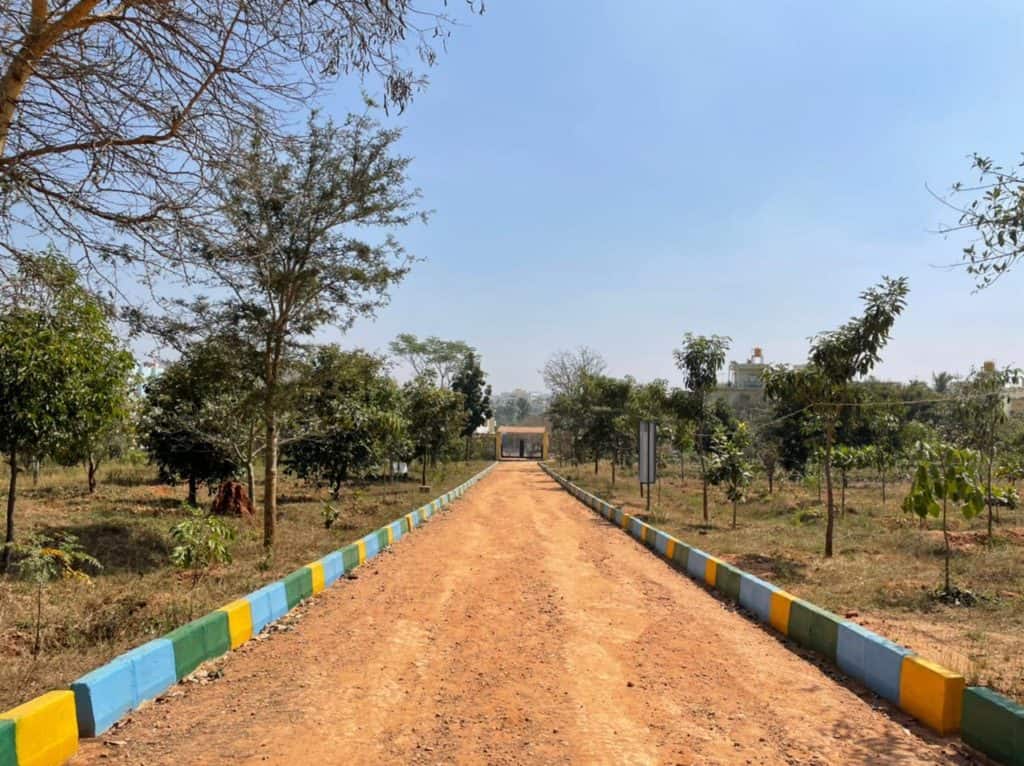On February 2, 2021, residents in and around Kanakapura Road sounded an alarm when they spotted excavators in the vicinity of the Turahalli forest.
When Gautham Kamath, one of the members of Changemakers of Kanakapura Road, and other residents confronted the officials operating the excavators, they received vague answers.
Initially, they said they were building a 280-ft compound wall. On further questioning, they backtracked and said they were carrying out de-weeding in order to prevent forest fires. Finally, they admitted to clearing a path for walkways. The plan, it turned out, was for a tree park.
Citizens’ outcry
Last December, Karnataka Chief Minister B.S Yeddiyurappa unveiled Bengaluru Mission 2022, a plan to transform the city’s infrastructure. The stated purpose is to enable faster commute and provide a cleaner and greener city.
The proposed plan includes developing lung spaces through the creation of tree parks in Turahalli, J.P Nagar, Mathikere and Kadugodi. Specifically for Turahalli, the plan entails converting 400 acres of the 597 acre forest, situated off Kanakapura Road, into a tree park.
The tree park is to have amenities such as a 10 km gravel walkway, a senior citizens’ gymnasium, a play area for children, toilet facilities, parking lot, etc. This has not gone down well with residents, environmentalists and activists.
Individuals and groups came together spontaneously. They strongly opposed the plan in a letter addressed to the Additional Principal Secretary, Forest, Ecology and Environment Department. They also sent the letter to Sanjai Mohan, Principal Chief Conservator of Forest.
The letter voiced their concerns regarding the tree park while pointing out that such a move would violate Section 2 of the Forest (Conservation) Act, 1980, and several other Supreme Court orders.
Missing the woods
The main concerns residents and activists alike have is that the thicket will be cleared to give way to concrete structures that will harm the local flora and fauna in the forest. “The diversity of the forest will be hard-hit,” says Ulhas Anand, a bird-watcher.

He says that on a normal day, one can spot almost 30-50 species of birds including peacocks, owls and raptors in a span of 2-3 hours. Talking about the city’s ecosystem which has fallen prey to rapid urbanisation, Ulhas says Turahalli must be protected at all costs or the diversity unique to this region will be lost forever. He opposes prioritising human utility over local wildlife.
Further concretisation will cause water tables to reduce drastically, warns Dr. Nimisha Agarwal, senior campaigner at Jhatkaa.org while talking about Bengaluru’s fast descent towards day zero.
Read more: Unchecked tree loss is wiping out the Slender Loris from Bengaluru
Additionally, the way forest winds sequester carbon is much higher because of the naturally sustainable system in place. “We will face severe impact if we reduce every avenue sequestering water and carbon,” she says. She also attributed the loss of vegetation and wild spaces to the increased human-animal conflict.
A petition by Jhatkaa.org, a Bengaluru-based organisation committed to building grassroots citizen power, has garnered much support in favour of conserving the forest in its natural state.
The petition, addressed to Yediyurappa and Sanjai Mohan, asks for only 35 acres of Turahalli Tree Park be allowed for public access while leaving Turahalli Minor Forest untouched. The protests also caught the eye of MLA Sowmya Reddy of Jayanagar constituency, who tweeted questioning the necessity of the proposed park and said she will talk to the Chief Minister on this.
Tree park already exists
Everyone this reporter spoke to underlined the fact that there is already an existing Turahalli tree park spread over 35 acres, and that it is grossly underutilised.

The existing tree park was created in 2011 and inaugurated by the then Chief Minister, Sadananda Gowda, along with a sculpture park in the vicinity. The park, overlooking the forest, already has facilities like pathways, benches, toilets, ticketing counter and gazebos.
“We are completely in support of developing this tree park and the underdeveloped sculpture park,” says Gautham Kamath. We definitely want walking spaces, but not at the cost of our forests, he adds.
Nimisha argues that unlike the forest, a tree park is not ecologically sustainable. “Turahalli is the last remaining vestige of forest land near the city. Artificially constructed small passages are in no way a substitute for a naturally existing ecosystem,” she says.
Echoing this, Bharat, a volunteer with Save Turahalli Campaign, raps the government for trying to replace natural diversity with manicured lawns to increase footfalls. To increase footfall, a number of amenities and infrastructure will have to be put in place, he notes.
Bharat has been one of the few lucky ones to see families of peacocks residing in Turahalli. He says this is an ideal breeding and nesting ground for them. He has spotted peacock eggs being laid in the terrain, and has also seen people take away those eggs.

The national bird is accorded the highest level of protection under the Wildlife Protection Act, 1972, Bharat says. He does not see a situation where humans and these birds can co-exist, as peacocks do not breed in places where there is human interaction. “The very existence of peacocks is proof that lesser the human interaction, the more wildlife thrives,” he said.
Read more: Bengaluru’s yes to Hesaraghatta film-city means a no to the Lesser Florican
He and others who are part of the Save Turahalli campaign are advocating a natural ecosystem that is left alone, and is not controlled by individuals who would want to curate it to fit the urban aesthetic.
Arguments against tree park
- Environmentalists question the very idea of a tree park in a forest
- It will destroy the local flora and fauna
- It violate Section 2 of the Forest (Conservation) Act, 1980, and several other Supreme Court orders.
- Concretisation will affect the water table.
- A tree park already exists on 35 acres of Turahalli, adjacent to the forest, and it is grossly underutilised.
- The way forest winds sequester carbon is much higher and this will be lost.
- Loss of vegetation and wild spaces will lead to increased human-animal conflict.
- Documents related to the proposed project are not in public domain and officials are opaque.
Violates several laws, SC orders
In addition to it being a bane to natural forestry, the proposed tree park is also in violation of a slew of Supreme Court judgements and the Forest Conservation Act of 1980.
Nimisha states that when the government passes a project, they are required to put out a detailed project report in the public domain. With regard to Turahalli, the plan is under wraps.
As government officials refuse to corroborate each other’s claims, the residents are also apprehensive about the lack of transparency surrounding the proposal. Bharath says that there is no way of accessing the detailed Bengaluru Mission document, and that they only have to rely on news reports quoting ministers.
What’s more, there is no Work Order issued for the commencement of non-forestry activities in a forested area.
Leo Saldanha, member of Environment Support Group and Chairperson of the Urban Forest Committee for Turahalli, says that neither he nor any of the members from the committee were consulted when this proposal was drawn up.
He refutes the claims made by the government that the UFC has approved the plan, stating that the committee has not had a meeting in a long time. When he met with PCCF last week, Mohan said they will consider the appeals made by citizens but refrained from making concrete promises, Leo reveals.
Leo says they have already filed complaints against encroachment, which the Forest Department is yet to pursue in order to recover the encroached land. That leaves him not very optimistic about the government making active efforts to conserve the forest.
Also read:
It should be a common-sense reaction for everyone to support keeping Turahalli as undisturbed as possible. Sadly, our political section is infested with greed and they are interested only in projects where they can make money. Keeping the status quo which is 1000s times more beneficial is not in their self interest.